Greek theater: most important works

Image: CurioSfera.com
The origin of our theater is in the Ancient Greece where a series of authors began to create works to be represented in public. These pieces were characterized by presenting stories from Greek mythology mixed with human drives making, thus, great themes such as love, revenge or loneliness were the forces that moved the characters. In this lesson from a TEACHER we are going to talk about the most important works of Greek theater and, therefore, we will take a tour with the names of the most outstanding Greek playwrights and the theatrical works that most marked an era.
Index
- Aeschylus' Orestes Trilogy
- Sophocles' Electra
- Sophocles' Oedipus the King
- Antigone, the best tragedy of Sophocles
- Euripides' Medea
- Euripides' Trojans
Aeschylus's Orestes trilogy.
Inside of the greek theater we find the work of some authors that have come complete to this day. Let us remember that this literary genre began to become very popular among the civilization of Ancient Greece and ended up being a channel of transmission of cultural knowledge as well as ideas and moral teachings to the population.
Aeschylus He was one of the Greek playwrights we must know. Of all his theatrical production, only one work has reached us in a complete and complete way. It's about the "Trilogy of Orestes", a trilogy that includes three works: Agamemnon, Coeforas and Eumenides.
This work tells us about different family crimes that are committed by well-known characters in Greek mythology. We are going to briefly analyze the 3 works to better understand their cultural contribution to our literature:
Agamemnon of Aeschylus
The first tragedy that is part of this trilogy is that of Agamemnon. Here we will learn about the murder that Clytemnestra carries out against Agamemnon, her husband. This event takes place at the time when the man returns from the Trojan War and the reason for this murder is to avenge the murder of Ifigenia, the daughter of the couple.
The action of this play takes place in the Plaza de Argos and when King Agamemnon returns from the war he will find that his wife is married to another man. He also meets Electra, her other daughter, who has denied her mother and lives as a slave.
Coeforas
Another of the works that are part of this trilogy is "Coeforas", a piece that takes place in front of the Palacio de los Átridas. Here we will meet Orestes, the fled son of Agamemnon, who will be ordered to assassinate his mother to avenge the murder of his father. This order is issued by the god Apollo and, when he reaches Argos, he will carry out the assassination plan with his sister Electra. Finally, Orestes will kill her mother and her husband and then flee the city.
Eumenides of Aeschylus
And finally, this trilogy is true with the play "Eumenides" that takes place in Delphi and on the Acropolis of Athens. The story will continue with the previous argument and, therefore, we will meet again with Orestes who, on this occasion, goes to Delphi to request the protection of Apollo. This occurs because the goddesses want revenge for the murder she has committed. Finally, thanks to Athena's intervention, Orestes will be forgiven.
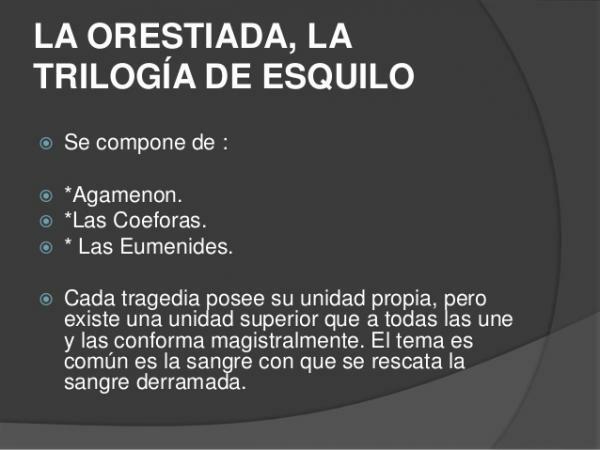
Image: Slideshare
Electra of Sophocles.
We continue with this correlation of the most important works of Greek theater to talk about "Electra", a piece created by Sophocles and that takes place in the palace of Mycenae. It is believed that this tragedy could be represented between the years 418 to 410 BC.
In this work of Sophocles we find that Agamemnon, when he returns to his city after the Trojan War, is assassinated by his wife Clytemnestra. The reason for this crime is because the king sacrificed the daughter of the marriage so that the ships could leave for Troy with the consent and favor of the gods. Now, the woman has married Egisto but she continues to live with the three children she had with Agamemnon.
In "Electra" the three children find out about the murder that his mother has committed and, because of this, Orestes leaves home, Crisostemis tries to continue with her life as if nothing but Electra decides to deny her mother. The latter, she prefers to live as a slave than to live with her murderous mother. He will wait for his brother to return from his escape to avenge the murder of his father.
As soon as Orestes returns to the city he meets with Electra to plan the revenge they will carry out. Finally, the two brothers will join forces to murder her mother and her new husband, and thus, avenge the death of his father.
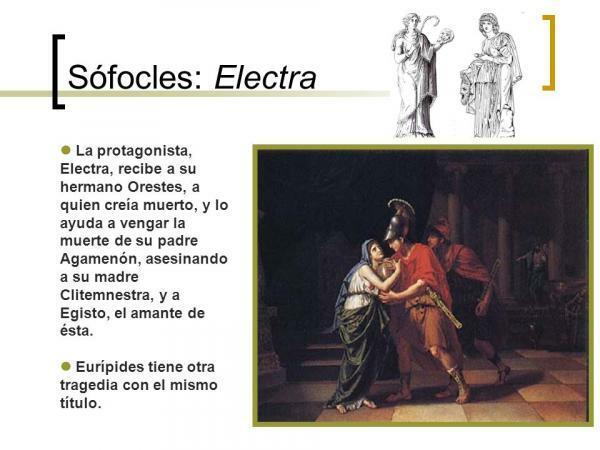
Image: Slideplayer
Sophocles' Oedipus the King.
Sophocles is also the authorship of another of the most important theatrical works within classical Greek theater. We talk about "King Oedipus", a work whose action takes place in Thebes and in which we will meet unforgettable characters from universal literature such as Oedipus and Jocasta.
In this tragedy we will meet the King of Thebes, Oedipus, that he lives with Jocasta, his wife. But, before marrying Oedipus, Jocasta was married to Laius, a man who was murdered at the hands of a stranger. The story of Sophocles tells us how Laius and Jocasta go to the oracle before their son is born; This reveals to them that his son would cause a great altercation in the kingdom and, therefore, the father decides to give his son to a shepherd so that he is born safe and sound but outside the family.
That child is Oedipus who, when he grows up, wants to discover who his real family is. In this quest he will meet a man whom he will put to death and, later, he will meet a sphinx who proposes a riddle to him. Oedipus manages to solve the riddle and that is when he becomes king of Thebes. Here he marries Jocasta, not knowing that she is his mother, and forms a family.
At the end of this tragedy, Oedipus will discover that his mother is Jocasta and that the man whom he killed was his biological father. Before this revelation, Jocasta will commit suicide and Oedipus will tear out his eyes.
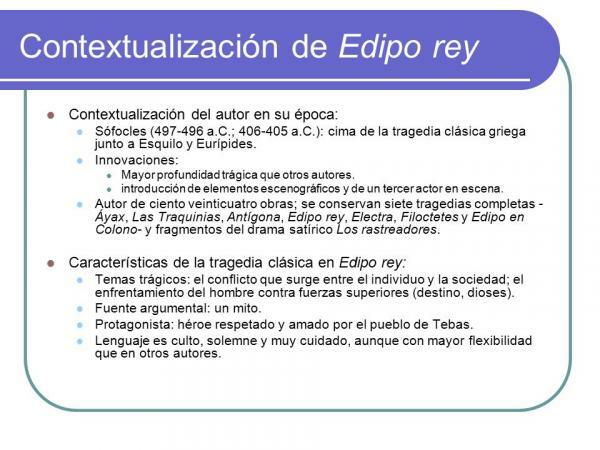
Image: Slideplayer
Antigone, the best tragedy of Sophocles.
Sophocles was one of the most prolific authors in the Greek theater. For this reason, we have to mention another of the pieces that this playwright created and that, even today, continues to be one of the essential within the history of universal theater: "Antígona".
This play takes place in the Thebes square and, here, we find a stage in which there are three doors: the one on the left is the room where the women are, and the central one is the king's door. "Antigone" is considered the best tragedy of Sophocles and, therefore, could not be missing in this lesson on the most important works of Greek theater.
The plot of this play introduces us to Antigone, one of the daughters of Oedipus, who wants to give a dignified burial to Polinice, her brother. However, the burial is forbidden so she decides to contrive to be able to circumvent the rules. To do this, he will cover Polinice's corpse with a little dirt, but the police of the moment will end up discovering this illegality. This makes Antigone is imprisoned in a cold and lonely cave that will end up being her grave.
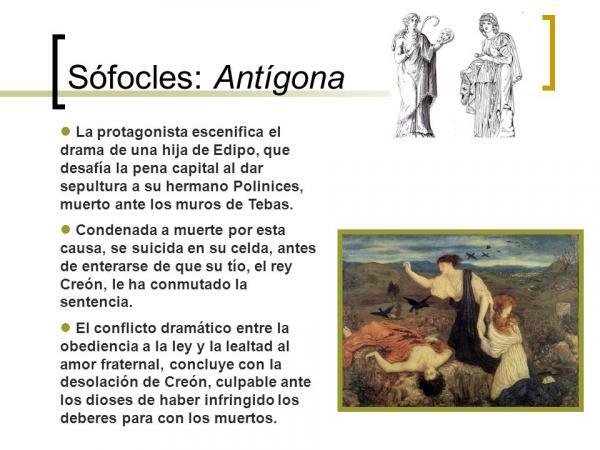
Image: Slideplayer
Medea of Euripides.
Another of the great poets of Greek antiquity was Euripides who wrote some of the best plays of the time. Among all of them, the one that has left the most mark in the history of literature has been "Medea", without a doubt. It is a work that premiered in 431 BC and that, for many, has been considered as the best work of the Greek tragic theater.
This piece takes place in Corinth, specifically, inside Medea's house. Here we will meet Medea, a foreign woman who comes from a distant world and very different from the one she lived in Ancient Greece. This woman has a romantic relationship with Jason, a Hellenic man with whom they have children. But Jason ends up betraying her and asks Glauce, another woman, to marry him.
Medea, mad with jealousy and blinded by the pain of betrayal, she will end up murdering Jason's fiancee as well as all the children she has with him.

Image: Slideshare
Euripides' Trojans.
And we end this lesson by talking about another of the most emblematic works of Euripides in Greek theater: The Trojans. It is a classic piece that introduces us to a group of Trojans, that is, female residents of Troy, who are turned into war slaves due to the bloody Trojan War.
Here we will meet Hecuba and many other women who have been retained such as Cassandra, Andromache or Helen of Troy herself. The play tells the story that these women lived with the end of the war. All of them were handed over to the enemy and separated from their families and children. The work explains to us how the new masters of these women are staying with them and separating them from everything they had been until now. This tragedy ends with the burning of Troy.
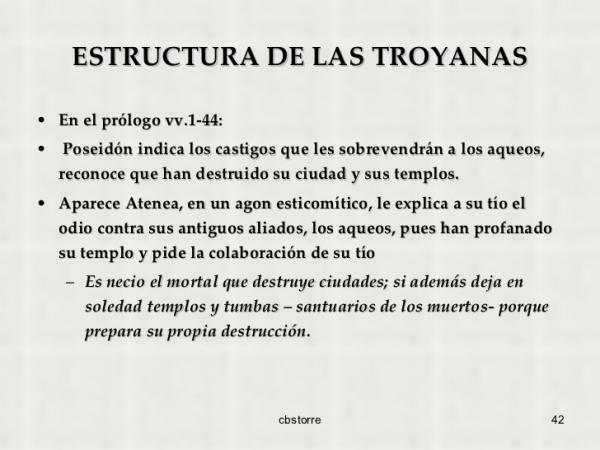
Image: Slideshare
If you want to read more articles similar to Greek theater: most important works, we recommend that you enter our category of History of Literature.



